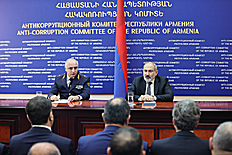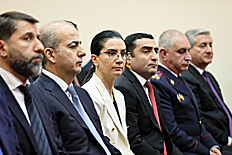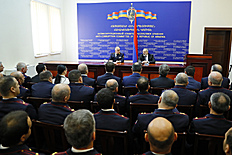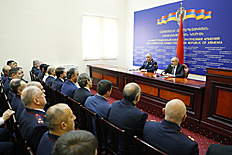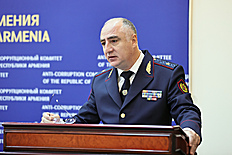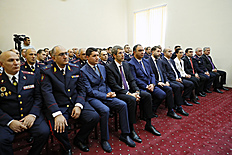Press releases
I hope we will really meet the legitimate and legal expectations of the citizens of the Republic of Armenia from the anti-corruption system. Prime Minister
more 3 photos
Prime Minister Nikol Pashinyan visited the Anti-Corruption Committee today and attended the event dedicated to the Anti-Corruption Committee employee's day and the second anniversary of the establishment of the structure.
Chairman of the Anti-Corruption Committee Sasun Khachatryan presented a report on the work done.
Prime Minister Pashinyan congratulated those present on the occasion of the second anniversary of the formation of the Anti-Corruption Committee and noted. "The popular, non-violent, velvet revolution that took place in Armenia in 2018 brought forward high expectations among the public, especially in the field of anti-corruption policy. Those expectations had two main directions. the first is to investigate, reveal and bring the recorded corruption cases, stories and mechanisms to the course and outcome prescribed by law. The second is to prevent and also be consistent in the issues of corruption taking place now, exclude the possibilities of its development and so on. Of course, in 2018, the expectation and the atmosphere was such that people very often expected the newly formed Government to go and deal with these issues through political, popular methods. But I must also state with satisfaction that we did not go that way, because we understood that those very processes contain great risks of going beyond the logic of the rule of law, the end result of which would actually be the exact opposite of the declared goal. Redistribution of property would take place, and illegally acquired funds would illegally go to new hands, and the reality would not change from this. And we decided to go along institutional paths and tried to understand what institutions we need so that the political agenda, which is not the agenda of a party or a government, but that of the people raised in a fair and reasonable manner, is effectively addressed. We decided to go the institutional way, and the Anti-Corruption Committee is one of the expressions of that institutional policy, but it is not the only one, because during this period, it is very important to record that we established an Anti-Corruption Court, a Corruption Prevention Commission in the Republic of Armenia, and also implemented a number of other institutional reforms. We spared no efforts to make the salaries in the judicial and legal system competitive with the salaries in the private sector. Basically, a lot of work has been done in this sense so that we can serve the proposed agenda," said the Head of the Government.
According to the Prime Minister, however, the public is not very satisfied with the progress of the works. "If we now conduct a poll among the public to get to know the extent they are satisfied and the extent they consider that the declared goals have been achieved, I do not think that we will have a very high level of satisfaction among the public. I am talking here not only about the examination of individual criminal cases, but also the mechanisms and pace of confiscation of illegal property, which I want to remind you, was also formed within the framework of our anti-corruption policy. Also, I think that when examining the effectiveness of the investigation of both anti-corruption and general criminal cases, we should definitely record in the statistics how many of these cases ended with verdicts. Because if there is no verdict, the public, as it happened in a number of cases, one day may wake up and read the headlines that this one was acquitted, the other was acquitted, and it is not clear to the public what is happening. Of course, we have to give a certain attitude to these statistics too, because we say that there are so many cases, the number of these cases is very high. People don't remember, let's say, hundreds or thousands of cases and their details, people have, so to speak, outstanding cases in their mind and are guided by them to evaluate the effectiveness of the country, the state, in fighting against corruption?"
According to Nikol Pashinyan, sometimes, following the course of some cases, people get the impression that it is not about a judicial process, but behind-the-scenes negotiations. "Taking the opportunity that the President of the Supreme Judicial Council, the Prosecutor General, the Minister of Justice and the heads of our investigative bodies are present, I would like to say that sometimes one gets the impression that these trilas are taking place, so to speak, in a holiday mode. The court session took place and was immediately postponed for one month, two months, three months, five months, and so people, in cases of outstanding value to them, receive the following basic message: it is a process, it is going, and sometimes there is an impression that this whole system is waiting for something to reach some kind of solution."
The Prime Minister noted that many objective and subjective reasons appear during the working discussions, which are also related to the workload of judicial systems. "However, in my opinion, the political time that the public gave us to form an effective system is running out. And if that time is not used effectively, that is, if the public does not see that there are concrete and effective systems behind the recorded political will of these statements, here we can have serious problems that can bring serious consequences.
When I look at the Government's agenda to see what else should we do to make the anti-corruption system more effective, I see that at least most of it has been done: institutional reforms, increases in payments and salaries. We have also taken other measures, including to more effectively protect the rights of those facing criminal charges. Among them, I would like to mention the new regulation, when the interrogations take place only under video recording," said Nikol Pashinyan.
According to the Prime Minister, this new system also implies a new quality of investigative professionalism, professional development, for which very specific incentives have been created. "The government does not have any authority to interfere in judicial processes, except for certain legislative initiatives and regulations. I think the public should receive concrete evidence that there are no behind-the-scenes games and performances here, and on the other hand, there is a clearly functioning state, judicial, and anti-corruption system. This is an extremely important issue, and on this issue, I think there should also be a certain public-state consolidation. But there is also the opposite side, when we say anti-corruption policy, everyone agrees with it, no one has any objection, when we say, confiscation of illegal property, everyone agrees with it, they say, of course, it is illegal property, it should be confiscated. When concrete cases appear under this criterion, which already refer to specific buildings, specific properties, specific names, it turns out that they are respected persons, have big friendship and so on. And here you understand that every step you take, you have to overcome enormous resistance," said the Head of the Government.
According to Nikol Pashinyan, this means that the corruption resistance in our country has not been overcome. "And this also explains why corruption still exists in our country, including in the state system, and sometimes, from time to time, it is estimated that not only does it exist, but corruption develops in new ways. And we should not treat these signals so frivolously. We must be able to go after everything that has been said, because if suddenly it turns out in the end that there is a game behind our anti-corruption policy, that will be the biggest disaster that we will face."
The Prime Minister emphasized the anti-corruption policy and noted that all the achievements and failures recorded in the Republic of Armenia in recent years are directly related to corruption. "There is only one explanation for the fact that despite all shocks and blows, for example in Armenia, we were able to not only ensure macroeconomic stability, but also continue to be in the dynamics of economic development. It is the effective implementation of anti-corruption decisions in the field. We have eliminated monopolies in the economy, we are fighting against tax privileges as sincerely as possible. I cannot say that it has been eliminated, because we have seen that even now new and technological forms of tax evasion are emerging and being developed, which complicate our problems. But I want to again emphasize economic stability, which is a key factor, because if there is no economic stability, if there is no stability of tax revenues, we cannot do anything at all. And I want us to appreciate and record this. Why is it so, as a result of creating a level playing field and opportunities in the economic sphere, which is connected with our first anti-corruption steps and for which political will was sufficient, but there are issues in which only political will is not sufficient, there must be effective mechanisms. And also all our problems and failures that we have had in all areas. When you want to understand why and how, you come to the conclusion that corruption is at least very crucial here. I cannot say that it is only a consequence of corruption, but corruption plays a very significant role there. And that is also the reason why we consistently continue the anti-corruption policy today," said Prime Minister Pashinyan.
Referring to the package of bills of anti-corruption legislation adopted last week, Nikol Pashinyan emphasized that these initiatives go against morals that existed for a decade, if not longer. "But I think the challenges facing our country force all of us, first of all public officials, to fit into a completely different standard and a different logic. And, of course, it will bring with it additional questions, we will also have complications in the implementation phase, not only in the sense that we will not want or there will be resistance, but these new systems still need to be understood, because there may be cases where we are unable to identify that this case fits in this or that criterion”.
The Head of the Government once again congratulated the Anti-Corruption Committee on the occasion of its establishment and thanked all the employees of the Anti-Corruption Committee for their work. "In addition, I want to draw everyone's attention to the fact that for the first time, outside of the Police and the National Security Service, we have an operational service that is part of the structure of the Investigative Body. This work is also very important, and after some time we should summarize the results, how effective it is and how much it is not, because I remember those discussions: there were many opinions in favor and many against. But, nevertheless, we made this decision and we will summarize it after some time. Our general conclusion is the following, which concerns both the Anti-Corruption Committee, the Government, investigative bodies, the Prosecutor's Office, and judicial bodies, that for several years in this field, as it is said, "we have sown, it's time to reap." That is, to see the "harvest and fruits", and it is very important that this "harvest" is abundant, because everyone's expectations are legitimate. When we say verdicts, we mean that there can be both types of verficts – guilty and not guilty. When there are acquittals, we need to go back and look at the quality of our investigation, why did this happen? This is very important, because all the time we talk about the quality of the investigation, but unless there is a verdict, we cannot objectively refer to the quality of the investigation, because the most important clue about the quality of the examination, from which we must draw conclusions, is the verdict. If according to the verdict someone is guilty, basically the investigation was of proper quality, if the verdict acquits someone, we need to go back and understand why we have brought people to court for so many years, and we need to address the quality of the investigation. No matter how much the anti-corruption policy and the anti-crime policy are fundamental to us and the public expectations are high, we cannot afford any illegality along the way, we cannot afford any illegal interference along that way and we cannot allow to undermine the rule of law in any way along that way. On the contrary, all this is done to make the rule of law in Armenia unshakable.
I congratulate and thank you again, and I hope that we will really meet the legitimate and legal expectations that the public, citizens of Armenia have from the anti-corruption system in general and from the Anti-Corruption Committee in particular," the Prime Minister concluded.
